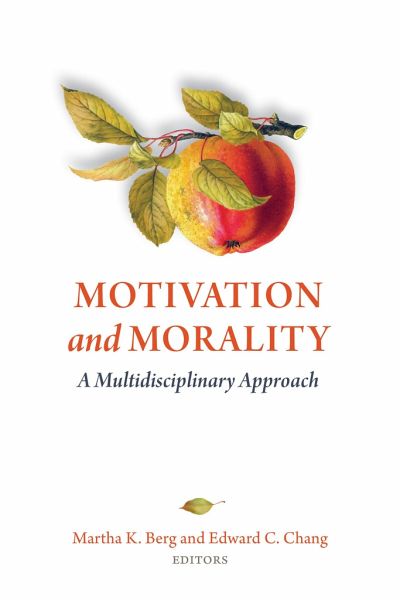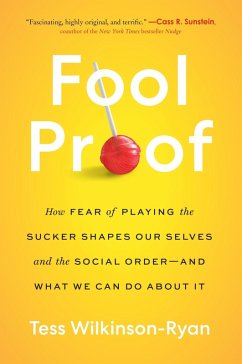
Motivation and Morality
A Multidisciplinary Approach
Herausgeber: Berg, Martha K; Chang, Edward C
Versandkostenfrei!
Versandfertig in über 4 Wochen

PAYBACK Punkte
42 °P sammeln!




What drives us to do good things, and to avoid doing bad? This book offers an integrative examination of the role of motivation in shaping moral cognition, judgment, and behavior.
Martha K. Berg, PhD is an industry researcher. She received her B.S. in psychology with distinction and her M.S. in global health from Duke University, and her M.S. and Ph.D. in social psychology from the University of Michigan. Dr. Berg has served as a student representative in the Society for Personality and Social Psychology, and as a student affiliate in the Center for the Science of Moral Understanding. She was selected to receive a Fulbright Research Grant in 2017, and her other awards and honors include the Robert B. Zajonc Scholars Award, the Ruth C. Hamill Graduate Student Research Award, and the Jerome S. Bruner Award for Excellence in Undergraduate Research. Edward C. Chang, PhD is a first generation Korean American, born in Seoul, South Korea. He is Professor of Clinical Science and Social Work, and a Faculty Associate in Asian/Pacific Islander American Studies and in the Center for Positive Organizations, Ross School of Business, University of Michigan. Dr. Chang received his B.A. in psychology and philosophy, graduating summa cum laude, from the State University of New York at Buffalo, and his M.A. and Ph.D. degrees from the State University of New York at Stony Brook. He completed his APA-accredited clinical internship at Bellevue Hospital Center-New York University Medical Center. Dr. Chang served as a program evaluator for the Michigan Department of Community Health – Social Determinants of Health, working with the Asian Center Southeast Michigan. He is serving or has served as an Associate Editor of Cognitive Therapy and Research, the International Journal of Existential Psychology and Psychotherapy, the Asian American Journal of Psychology, and the Journal of Personality and Social Psychology. Dr. Chang has published more than two hundred empirical and scholarly works focusing on optimism and pessimism, perfectionism, loneliness, social problem solving, and cultural influences on behavior. He is the editor of Optimism and Pessimism: Implications for Theory, Research, and Practice (2001) and Self-Criticism and Self-Enhancement: Theory, Research, and Clinical Implications (2007), and is a co-editor of Virtue, Vice, and Personality: The Complexity of Behavior (2003), Social Problem Solving: Theory, Research, and Training (2004), Judgments Over Time: The Interplay of Thoughts, Feelings, and Behaviors (2006), Positive Psychology in Racial and Ethnic Groups: Theory, Research, and Practice (2016), Biopsychosocial Approaches to Understanding Health in South AsianAmericans (2018), Treating Depression, Anxiety, and Stress in Ethnic and Racial Groups: Cognitive Behavioral Approaches (2018), and The International Handbook of Positive Psychology: A Global Perspective on the Science of Human Existence (2022). Dr. Chang was recently identified as one of the 70 “top producers” of scholarly works in clinical psychology, from a pool of 1,927 core clinical faculty from Ph.D. programs across the U.S. His works have received wide media coverage, from The Chronicles of Higher Education to the Wall Street Journal. Dr. Chang has mentored one of the highest numbers of undergraduate students within the department. He has been recognized for his many years of teaching excellence at the University of Michigan by being selected for the LSA Excellence in Education Award in 2008 and by the University Undergraduate Teaching Award in 2011.
Produktdetails
- Verlag: American Psychological Association (APA)
- Seitenzahl: 278
- Erscheinungstermin: 14. Februar 2023
- Englisch
- Abmessung: 226mm x 152mm x 15mm
- Gewicht: 499g
- ISBN-13: 9781433838729
- ISBN-10: 1433838729
- Artikelnr.: 64231239
Herstellerkennzeichnung
Libri GmbH
Europaallee 1
36244 Bad Hersfeld
gpsr@libri.de
Für dieses Produkt wurde noch keine Bewertung abgegeben. Wir würden uns sehr freuen, wenn du die erste Bewertung schreibst!
Eine Bewertung schreiben
Eine Bewertung schreiben
Andere Kunden interessierten sich für











